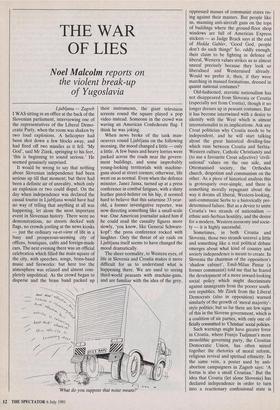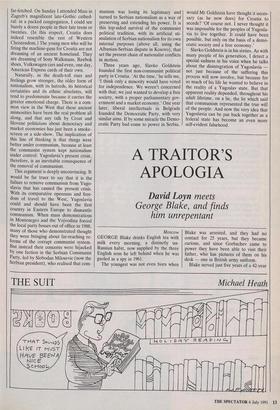THE WAR OF LIES
Noel Malcolm reports on
the violent break-up of Yugoslavia
Ljubljana — Zagreb I WAS sitting in an office at the back of the Slovenian parliament, interviewing one of the representatives of the Liberal Demo- cratic Party, when the room was shaken by two loud explosions. A helicopter had been shot down a few blocks away, and had fired off two missiles as it fell. 'My God', said Mr Zizek, springing to his feet, `this is beginning to sound serious.' He seemed genuinely surprised.
It would be wrong to say that nothing about Slovenian independence had been serious up till that moment; but there had been a definite air of unreality, which only an explosion or two could dispel. On the day when independence was declared the casual tourist in Ljubljana would have had no way of telling that anything at all was happening, let alone the most important event in Slovenian history. There were no demonstrations, no streets decked with flags, no crowds jostling at the news kiosks — just the ordinary va-et-vient of life in a busy and prosperous-seeming city of offices, boutiques, cafés and foreign-made cars. The next evening there was an official celebration which filled the main square of the city, with speeches, songs, brass-band music and fireworks: but here too the atmosphere was relaxed and almost com- pletely unpolitical. As the crowd began to disperse and the brass band packed up their instruments, the giant television screens round the square played a pop video instead. Someone in the crowd was waving an American Confederate flag. I think he was joking.
When news broke of the tank man- oeuvres round Ljubljana on the following morning, the mood changed a little — only a little. A few buses and heavy lorries were parked across the roads near the govern- ment buildings, and some improbably young-looking territorials with machine- guns stood at street corners; otherwise, life went on as normal. Even when the defence minister, Janez Jansa, turned up at a press conference in combat fatigues, with a shiny leather pistol-holster on his hip, it seemed hard to believe that this saturnine 33-year- old, a former investigative reporter, was now directing something like a small-scale war. One American journalist asked him if he could read the casualty figures more slowly, 'you know, like General Schwarz- kopf : the press conference rocked with laughter. Only the threat of air raids on Ljubljana itself seems to have changed the mood dramatically.
The sheer normality, to Western eyes, of life in Slovenia and Croatia makes it more difficult for us to understand what is happening there. We are used to seeing third-world peasants with machine-guns, and are familiar with the idea of the grey, `What do you suppose that noise means?' oppressed masses of communist states ris- ing against their masters. But people like us, manning anti-aircraft guns on the tops of buildings where the ground-floor shop windows are full of American Express stickers — as Judge Brack says at the end of Hedda Gabler, 'Good God, people don't do such things!' So, oddly enough, their claim to be fighting in defence of liberal, Western values strikes us as almost unreal precisely because they look so liberalised and Westernised already. Would we prefer it, then, if they were marching in massed formations, dressed in quaint national costumes?
Old-fashioned, atavistic nationalism has not disappeared from Slovenia or Croatia (especially not from Croatia), though it no longer dresses up in peasant costumes. But it has become intertwined with a desire to identify with the West which is almost internationalist in its implications. Ask any Croat politician why Croatia needs to be independent, and he will start talking about the great historical dividing-line which runs between Croatia and Serbia: Western culture, Catholic Christianity and (to use a favourite Croat adjective) `civili- sationaf values on the one side, and Ottomanised society, the Orthodox church, despotism and communism on the other. As a piece of historical analysis this is grotesquely over-simple, and there is something morally repugnant about the way it dooms all liberal, Western-looking, anti-communist Serbs to a historically pre- determined failure. But as a device to unite Croatia's two strands of nationalism ethnic anti-Serbian hostility, and the desire for a modern, Western economy and socie- ty — it is highly successful.
Sometimes, in both Croatia and Slovenia, those two strands unravel a little and something like a real political debate emerges about what kind of country and society independence is meant to create. In Slovenia the chairman of the opposition's `shadow cabinet', Emil-Milan Pintar (a former communist) told me that he feared the development of a more inward-looking social policy which might discriminate against immigrants from the poorer south- ern republics. Mr Zizek from the Liberal Democrats (also in opposition) warned similarly of the growth of 'moral majority'- style politics; but so far there are few signs of this in the Slovene government, which is a coalition of six parties, with only one of- ficially committed to 'Christian' social policies.
Such warnings might have greater force in Croatia, where Franjo Tudjman's more monolithic governing party, the Croatian Democratic Union, has often mixed together the rhetorics of moral reform, religious revival and spiritual ethnicity. In the same vein, a poster used by anti- abortion campaigners in Zagreb says: 'A foetus is also a small Croatian.' But the idea that Croatia (let alone Slovenia) has declared independence in order to turn into a reactionary confessional state is far-fetched. On Sunday I attended Mass in Zagreb's magnificent late-Gothic cathed- ral: in a packed congregation, I could see barely a dozen people in their late teens or twenties. (In this respect, Croatia does indeed resemble the rest of Western Christendom.) The young men who will be firing the machine-guns for Croatia are not dreaming of an ancient homeland. They are dreaming of Sony Walkmans, Reebok shoes, Volkswagen cars and even, one day, American Express cards of their own.
Naturally, as the death-toll rises and feelings grow stronger, the older form of nationalism, with its hatreds, its historical certainties and its ethnic absolutes, will tend to predominate because it carries the greater emotional charge. There is a com- mon view in the West that these ancient animosities have been the real problem all along, and that any talk by Croat and Slovene politicians about democracy and market economies has just been a smoke- screen or a side-show. The implication of this line of thinking is that things were better under communism, because at least the communist system kept nationalism under control: Yugoslavia's present crisis, therefore, is an inevitable consequence of the removal of communism.
This argument is deeply unconvincing. It would be far truer to say that it is the failure to remove communism from Yugo- slavia that has caused the present crisis. With its comparative openness and free- dom of travel to the West, Yugoslavia could and should have been the first country in Eastern Europe to dismantle communism. When mass demonstrations In Montenegro and the Vojvodina forced the local party bosses out of office in 1988, many of those who demonstrated thought they were bringing about far-reaching re- forms of the corrupt communist system. But instead their concerns were hijacked by one faction in the Serbian Communist Party, led by Slobodan Milosevic (now the Serbian president), who realised that com- munism was losing its legitimacy and turned to Serbian nationalism as a way of preserving and extending his power. It is this lop-sided survival of the communist political tradition, with its artificial sti- mulation of Serbian nationalism for its own internal purposes (above all, using the Albanian-Serbian dispute in Kosovo). that set the present chain of nationalist conflicts in motion.
Three years ago, Slavko Goldstein founded the first non-communist political party in Croatia. 'At the time,' he tells me, `I think only a minority would have voted for independence. We weren't concerned with that; we just wanted to develop a free society, with a proper parliamentary gov- ernment and a market economy.' One year later, liberal intellectuals in Belgrade founded the Democratic Party, with very similar aims. If by some miracle the Demo- cratic Party had come to power in Serbia,
would Mr Goldstein have thought it neces- sary (as he now does) for Croatia to secede? 'Of course not. I never thought it was impossible for the peoples of Yugosla- via to live together. It could have been possible, but only on the basis of a demo- cratic society and a free economy.'
Slavko Goldstein is in his sixties. As with many people of his generation, I detect a special sadness in his voice when he talks about the disintegration of Yugoslavia not just because of the suffering this process will now involve, but because for so much of his life he wanted to believe in the reality of a Yugoslav state. But that apparent reality depended, throughout his adult lifetime, on a lie, the lie which said that communism represented the true will of the people. And now the very idea that Yugoslavia can be put back together as a federal state has become an even more self-evident falsehood.



















































 Previous page
Previous page